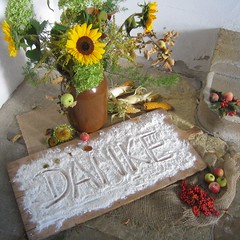in my post yesterday i referred to the thanksgiving weekend. some of you readers in the US might have thought that i ought to take the confucius on confusion course i talked about the day before. thanksgiving isn’t until late in november!
but, actually, this time i’m not confused. i could have pointed out, of course, that canadian thanksgiving is this weekend, about six weeks before the one in the US.
as you know, gratitude is an important topic on this blog so i’d like to talk a bit about thanksgiving festivals that some of you may not know very much about.
here in canada, we celebrate thanksgiving on the second monday in october. apparently, the first time it was celebrated by caucasians was by captain james frobisher who was thankful that he had survived a long journey in 1578, almost 50 years before the famous pilgrim’s thanksgiving in the US. says david watts in an article on canadian thanksgiving
frobisher sailed under elizabeth I, whose reign was marked by gratitude from beginning to end. for her first 20 years she held public thanksgiving simply for having lived to ascend the throne.
thanksgiving, of course, is a harvest festival, and neither canadians nor americans “invented” it. harvest festivals are as old and varied as agriculture, and maybe they were even held in hunter-gatherer cultures. so naturally, there were pre-colonial harvest celebrations among our first nations, such as the iroquois haudenosaunee, whose thanksgiving prayer you can read here.
germany, where i come from, has a harvest celebration in the christian churches that is held on the first sunday of october. it’s called “erntedankfest” (literally, “ harvest thanks feast”). in a tradition that, like so many christian celebrations, clearly harkens back to pagan times, church altars are richly decorated with bundles of wheat, apples, flowers, cornucopias and other goodies. some towns and villages have processions with decorated tractors and other agricultural implements.
harvest thanks feast”). in a tradition that, like so many christian celebrations, clearly harkens back to pagan times, church altars are richly decorated with bundles of wheat, apples, flowers, cornucopias and other goodies. some towns and villages have processions with decorated tractors and other agricultural implements.
another harvest celebration that’s important for people living in vancouver, which has a high proportion of people with a chinese background, is the mid-autumn or moon cake festival. it has been celebrated in asia for the last 3,000 years and falls on the week of the full moon closest to fall equinox. equal in importance to chinese new year, it is a time of family and togetherness – and a time for eating absolutely delicious moon cakes
